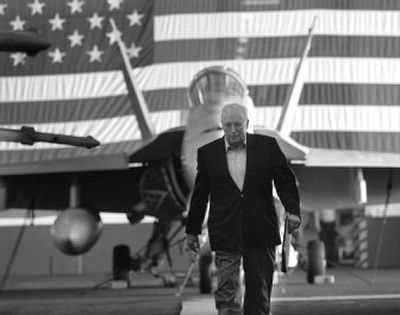Cheney sends warning to Iran

Aboard an aircraft carrier in the Persian Gulf 150 miles off Iran’s coast, Vice President Dick Cheney warned Tehran on Friday that the United States and its allies would not allow Iran to acquire nuclear weapons, close off vital sea lanes for oil supplies, or control the Middle East.
Cheney issued the blunt warning during his Middle East tour, and just two days before Iranian President Mahmoud Ahmadinejad makes his own trip to the gulf. The twin visits reflect the growing rivalry between Washington and Tehran for influence in the region.
“Throughout the region, our country has interests to protect and commitments to honor,” Cheney told Navy staff aboard the USS John C. Stennis.
“With two carrier strike groups in the gulf, we’re sending clear messages to friends and adversaries alike. We’ll keep the sea lanes open. We’ll stand with our friends in opposing extremism and strategic threats. We’ll disrupt attacks on our own forces. We’ll continue bringing relief to those who suffer and delivering justice to the enemies of freedom.”
Despite Cheney’s tough talk, however, the United States faces so many challenges in Iraq that it is also trying to launch diplomatic dialogue with Tehran to help stabilize the war-ravaged country.
As Cheney spoke in the gulf – after stops in Iraq and the United Arab Emirates – the State Department was working to schedule a meeting within the next two weeks between senior U.S. and Iranian officials in Baghdad, U.S. officials said Friday.
The divergent approaches toward Iran reflect the tensions within the administration, particularly between the State Department and the vice president’s office about whether to engage with Iran and, if so, how far to go. The bilateral talks being planned and the scope of discussion will be reviewed after the vice president returns from his tour next week, U.S. officials say.
Some in the administration refer to the divergence as a good-cop, bad-cop strategy, others say it reflects a deep policy divide, with Cheney trying to stall or undermine diplomatic outreach efforts.
Analysts say U.S. strategy is instead simply contradictory.
“On the one hand, U.S. policy involves a series of coercive steps – U.N. resolutions, financial sanctions, arresting Iran’s operatives in Iraq, trying to mobilize the gulf states against Iran, giving the kind of speeches with symbolism done today – that is quite comprehensive,” said Ray Takeyh of the Council on Foreign Relations. “On the other side, it’s an offer to negotiate that is not well laid-out. But the conciliatory effort is totally negated by the coercive steps, which is why it’s not working.”